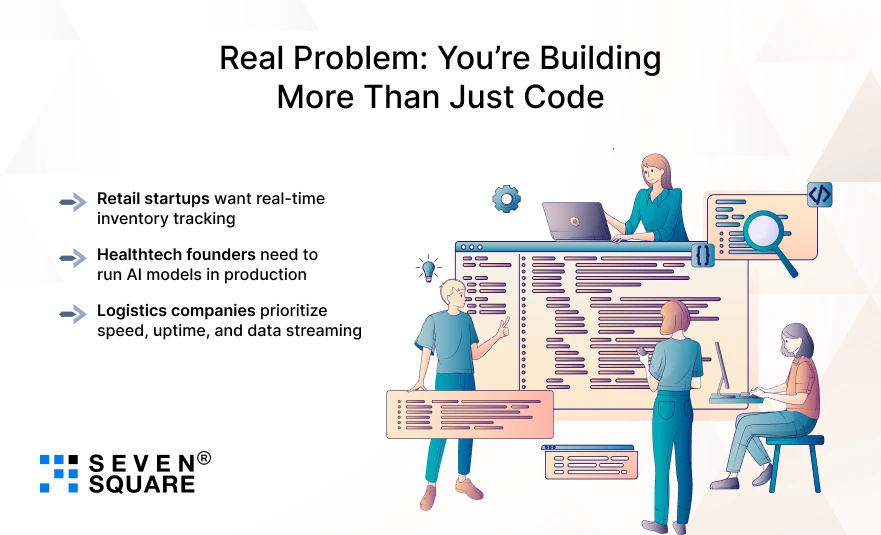We want to build fast, but not at the cost of future-proofing.
That’s the line we hear from most startup founders when they’re stuck choosing between Node.js vs Python for backend development.
You want fast iterations. Your investors want scalable growth. Your users expect no lag, no downtime.
So, the tech stack you pick now has a long tail & it changes your app’s performance, cost, and ability to evolve.
At Seven Square, we’ve delivered backend solutions for fintech, edtech, logistics, SaaS, and healthcare startups, each with unique needs.
And time and again, this question pops up: Should we use Node.js or Python for our backend in 2025?
If you are trying to figure out the differences between NodeJs vs Python, then you are at the right place.
Node.Js vs Python: Quick Comparison for 2025
You can go through the quick comparison of NodeJs vs Python for the backend.
| Criteria | NodeJs | Python |
| Performance | High-speed (event-driven, non-blocking). | Slower for I/O, better for CPU tasks. |
| Scalability | Excellent for real-time & microservices. | Good, but with more setup. |
| Community & Libraries | Large, growing JavaScript ecosystem. | Vast scientific and ML libraries. |
| Use Cases | APIs, real-time apps, SPAs. | AI/ML, data-heavy, enterprise apps. |
| Learning Curve | Easier for JavaScript developers. | Beginner-friendly syntax. |
| Best For | Real-time & fast I/O apps. | Data-heavy & AI-based solutions. |
Real Problem: You’re Building More Than Just Code

You’re not choosing between two languages.
You’re deciding how your backend will scale, perform, and adapt to unknown challenges.
Will you be building an analytics-heavy dashboard for your SaaS customers in 3 months? Will your healthcare app need HIPAA-compliant real-time messaging?
At Seven Square, we see this play out across industries:
- Retail startups want real-time inventory tracking (Node.js wins).
- Healthtech founders need to run AI models in production (Python excels).
- Logistics companies prioritize speed, uptime, and data streaming (Node.js dominates).
Node.js Performance vs Python: Who Wins?
NodeJS:
- When it comes to performance, Node.js is built for speed.
- It uses an event-driven, non-blocking I/O model that allows your backend to handle thousands of concurrent requests with low latency.
- This makes Node.js performance vs Python a clear comparison in 2025.
- If performance, speed, and real-time response matter to your backend in 2025, Node.js is the smarter choice.
Explore the top features of NodeJs 24 version.
Python:
- Python is powerful, inherently synchronous, and not designed for handling heavy I/O operations at scale.
- Even with libraries like asyncio, it struggles under the kind of load Node.js handles with ease.
- In high-traffic applications such as real-time dashboards, chat systems, or streaming platforms, Node.js outperforms Python consistently.
- We’ve benchmarked both in real-world projects and seen up to 3x faster execution with Node.js for concurrent workloads.
Winner: NodeJs
Node.Js Scalability vs Python: Which One is Better?
NodeJs:
- In the battle of Node.js scalability vs Python, Node.js continues to take the lead, especially in 2025, where microservices & modular deployments are the norm.
- Node.js is naturally suited for horizontal scaling thanks to its lightweight architecture and event loop.
- It’s a go-to for cloud-native applications, containerized workloads, and SaaS platforms that need to scale fast.
Python:
- Python can scale too, but it demands more effort, multi-threading setups, WSGI servers, and complex worker processes.
- This adds latency and DevOps overhead. If you’re building a multi-tenant SaaS backend, Node.js provides faster deployment, easier module reuse, and reduced infrastructure cost.
We’ve built systems for logistics and delivery startups using Node.js that scale smoothly under demand spikes.
Whether it’s autoscaling APIs or distributed microservices, Node.js wins for backend scalability in 2025.
Winner: Node.js
Node.Js vs Python for Real-Time Apps in 2025
NodeJs:
- If you’re developing real-time apps in 2025, such as chat apps, gaming platforms, or live dashboards, Node.js is the best backend choice.
- Its non-blocking architecture allows real-time data transmission over WebSockets or server-sent events with minimal delay.
- This makes it ideal for apps where millisecond latency matters.
- In real-world projects like our custom-built delivery tracking system, Node.js reduced response lag by over 50% compared to Python.
- Node.js is faster, lighter, and more production-ready.
Python:
- Python, on the other hand, isn’t inherently designed for real-time environments.
- Yes, frameworks like FastAPI and libraries like Socket.IO exist for Python, but they introduce extra layers and complexity.
- For founders and product managers aiming to build scalable and responsive real-time systems, Node.js vs Python for real-time apps in 2025 isn’t even close.
Winner: Node.js
Python vs Node.js for Machine Learning & Analytics
- When it comes to machine learning and analytics, Python wins hands down.
- Its ecosystem of ML libraries like TensorFlow, PyTorch, Scikit-learn, and Pandas is unmatched.
- Python has become the backbone of AI development in 2025, used by data scientists, AI engineers, and backend developers alike.
- Node.js is a general-purpose backend technology, but it lacks native ML capabilities.
- If your app needs data analytics, AI-based recommendations, or predictive modeling, then Python vs Node.js for machine learning and analytics is a no-contest; Python is the best fit.
Explore the top machine learning libraries to use.
At Seven Square, when building ML-powered platforms (like an AI-based tutor app), we always recommend Python for its speed, flexibility, and wide adoption in the ML space.
Node.js may support ML via APIs, but the real power still belongs to Python.
Winner: Python
Community Support & Ecosystem in 2025: Which one has Better?
In 2025, both Node.js and Python boast active and mature communities, but their strengths lie in different areas.
NodeJS:
- Node.js benefits from its deep integration with the JavaScript ecosystem, making it a favorite among full-stack developers.
- If your team already uses React, Vue, or Angular, choosing Node.js ensures a unified JavaScript stack, speeding up development and reducing onboarding time.
Python:
- Python, meanwhile, has built a strong reputation in data science, AI, and enterprise development.
- It’s supported by decades of tooling and libraries that simplify scientific computing.
- If your backend is meant to serve a data-intensive or AI-powered system, Python’s support is broader.
In the battle of Node.js vs Python community support and ecosystem, Node.js is more aligned with modern web and mobile application stacks, while Python excels in analytics and machine learning.
Winner: Tie (It depends upon Use cases)
Node.js vs Python for Microservices and APIs
- For microservices architecture and RESTful APIs, Node.js is widely adopted in 2025 due to its speed, modular structure, and lightweight performance.
- It’s built for containerized deployments using Docker and Kubernetes, and fits naturally into CI/CD pipelines.
- Most companies that use Node.js for backend choose it because it simplifies API development and allows for quick iteration.
- Python, with frameworks like Flask and FastAPI, can also handle API development efficiently, but it’s more resource-heavy and has a slightly steeper performance curve in large-scale microservice environments.
- At Seven Square, we’ve helped clients build multi-tenant SaaS systems using Node.js where APIs need to scale independently across modules.
- So, when comparing Node.js vs Python for microservices and APIs, Node.js continues to win in speed, developer productivity, and scalability.
Winner: Node.js
Should You Choose Python or Node.js Backend in 2025?
Here’s a simple rule:
- Choose Node.js if your app demands real-time performance, fast iterations, or microservice flexibility.
- Choose Python if your app is analytics-heavy, needs AI/ML, or involves scientific computing.
From Code to Scale: What Seven Square Promises?

We’re not just backend developers, we’re strategic partners for ambitious startups.
Our developers combine their Node.js expertise, Python engineering, and product thinking to help founders across industries build, scale, and ship with confidence.
- Backend Experts: Deep experience in Node.js development and Python backend engineering. Proven track record in building APIs, real-time apps, and microservices.
- Fast Delivery: We deliver backend solutions on time. Lean sprints, fast iterations, and ready-to-scale architecture.
- Cross-Industry Experience: Built custom backend systems for fintech, SaaS, logistics, healthtech, and more. Custom Node.js and Python solutions based on real product challenges.
- Quality That Lasts: Scalable, maintainable, and secure codebases from day one. Follow best practices for Node.js performance, Python security, and long-term success.
Want to Get the Best NodeJs Solution? Contact Us Now!
Product Thinking > Tech Debates
We’ve worked with startup founders who initially chose Python because it felt “easier.” Later, they had to rebuild parts in Node.js due to performance bottlenecks.
Others started with Node.js but struggled with integrating AI features and had to introduce Python microservices.
The smarter move? Build with clear product goals, not just tech preferences.
Want a smart hybrid architecture? We’ve done that with Node.js for APIs, Python for ML modules.
Final Verdict: Node.js or Python?
There’s no one-size-fits-all. But in 2025, if you:
- Want speed, real-time updates, or unified JS stack → Node.js
- Need ML power, data-heavy processing, or scientific tools → Python
Or combine both.
At Seven Square, we build to ensure that you have the best product.
FAQs
- Yes, Node.js is better for scalable web apps because of its lightweight architecture and built-in support for asynchronous operations.
- It fits perfectly with microservices & containerized environments, making it a go-to backend framework for SaaS startups and enterprise apps.
- While Python can support real-time apps using frameworks like FastAPI or libraries like Socket.IO, it’s not naturally built for it.
- Node.js performs well in real-time communication to offer smooth WebSocket integration and faster event handling for live dashboards, messaging, and gaming apps.
- Python is the clear winner for machine learning and data analytics.
- It offers rich libraries like TensorFlow, PyTorch, and Scikit-learn, making it the preferred choice for AI-powered backend systems.
- Node.js doesn’t provide direct support for ML, but it can integrate with Python services.
- Python is easier for beginners due to its readable syntax and gentle learning curve.
- Node.js is ideal for developers with JavaScript experience, allowing full-stack development in one language.
- Your team’s background can influence which is easier to adopt.